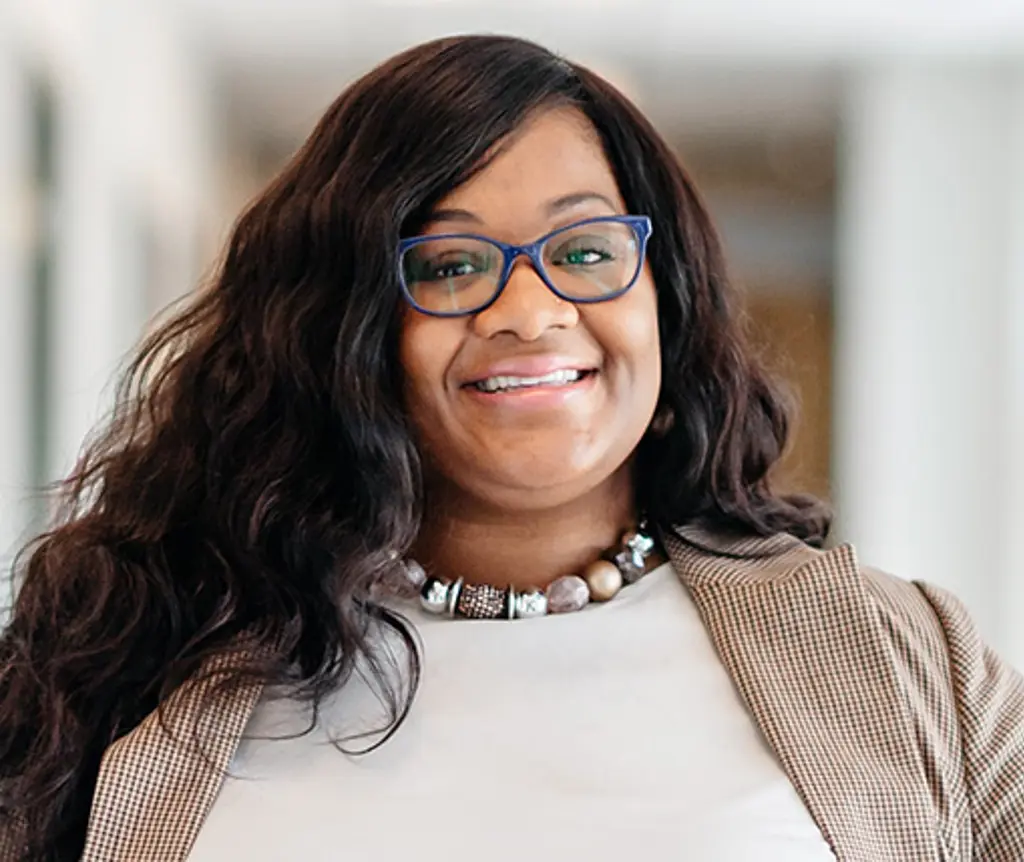For Black History Month, a variety of Black professionals from throughout RTI reflected on their careers for a series of articles shared with staff. The Insights blog is sharing this interview with Tamara Terry, a 23-year RTI employee with expertise in survey science who currently works with the University Collaboration Office.
What is your role at RTI and your area of expertise?
I am the director of academic research engagement within RTI’s University Collaborations Office. My areas of expertise at RTI include creating and leading strategic partnerships with university collaborators, survey data collection, project management, strategic and community partnership management, strategies and engagement for Equity, Diversity, Inclusion, and Belonging (EDIB), leading and developing research teams and providing senior level consultation for enhanced performance.
How long have you been with RTI, and what have been some of your favorite moments during that time?
I have worked at RTI for 23 years including my time as a contractor. I have so many favorite memories over my time.
Being a part of the team that helped build our original research operation center and seeing that evolve from a call center to a fully functional center with telephone interviewers that were intensively trained and fully understood the extent of their role and the impact that research would have on the lives of people across the United States. In addition, this evolution included having premiere data capture and fulfillment capabilities providing a real service to RTI and our clients.
The progression of EDIB work — our ability to grow and move the needle in the diversity, equity, and inclusion space — has been amazing to watch. We are not only living our mission to improve the human condition with our research but are also intentional about how our EDIB and Employee Resource Group (ERG) activities are improving the lives of the people that work at RTI. Deciding to incorporate EDIB strategies into the DNA of RTI wasn’t just a trendy moment for us, and while other companies pull back on their EDIB work, RTI has stayed the course.

Growing up, did you encounter other Black people in the career field you are in, and how did they influence and motivate you? Who were some of your biggest inspirations to pursue your dreams at the time?
Growing up, I didn’t really see a lot of people that were close to me in the STEM field, however I have so many strong Black leaders in my family that have shaped the person I am today.
My uncle was an educator and principal for many years at a high school in Troy, Michigan. He was so influential and had a direct line into planting seeds in the lives of students that will eventually become productive citizens in society.
My parents are a huge inspiration as well. I would argue that I have the best parents in the whole entire world. For example, when my parents got married, my mom dropped out of college to raise me and my sisters—6 girls! When I went to college, she went back to school (my dad committed to cooking for our family) to be a nurse and I literally saw her juggle life and school to pursue her dreams for MANY years. 20 plus years later, my mommy is a thriving Family Nurse Practitioner and my parents have had a medical clinic that provides health care to people in Eastern North Carolina. She is the true definition of perseverance and is a reminder that regardless of what your circumstances are, YOU CAN DO IT. She is my motivation!
My father is a prominent business leader in Eastern NC area also, and he taught me not to chase money, but rather chase after your passions, which I’ve done. My passion is helping and giving back where I can, and I believe that if you put good energy into the world, good energy will come back to you. My father is kind and generous and I try to emulate those behaviors in my daily interactions.
Black scientists and researchers are underrepresented in the fields of science and research. Why do you think representation is important?
It’s important that our world and more specifically our kids see people that look like them in the fields they aspire to be a part of. It’s critical that they see themselves represented. For example, whenever people ask me what I do for a living, and I say I’m a scientist, they are always amazed that I’m a woman and a Black scientist. I never really understood that impact, but now that I am older, I get it and it motivates me to help give visibility to the next generation of Black scientists.
I’m committed to doing my part to be more intentional about planting seeds in our Black youth and giving visibility into STEM fields so that we have someone they can aspire to be.
How have you seen RTI change and evolve over your time at the institute?
When I started at RTI it was not uncommon for me to be the only Black person in the room, and being the only one, can be a challenge. But over the years, I have really seen the institute add so much more color to RTI. My heart smiles when I’m walking on campus or grabbing lunch in Holden, and I see all the melanin skin around me. There is a sense of pride, community, and belonging that I’m experiencing now that I’ve never felt before. This is a clear result of our DE&I efforts, and I am proud of that.
RTI is not perfect, but we try to put our best foot forward consistently. To be honest, I don’t know if perfection is what we’re looking for, because it’s impossible to achieve. The aim should be extreme productivity, unwavering improvement and consistent progression, which we accomplish at RTI every day. Working for a company that is trying their best to do the right thing makes me proud and that is why I continue to work here.
What creates a sense of belonging and inclusion for you at RTI?
Inclusion — I feel like I am included in a lot of things, and personally feel fortunate to be seen and heard in my workplace. With that said, it’s not about me and I want other people to feel that same inclusion. We all need to be cognizant of including new voices and experiences. For example, I am mindful in meetings to give space for people that haven’t had a chance to bring their voice into the conversation and open space for them to feel safe to do that.
Belonging — is very different as it aligns with feeling valued, wanted, needed, and appreciated. A culture of belonging also gives me the freedom to show up as my authentic self all the time not just in February. I think that’s a space that we are still working on at RTI. We are seeking to understand what people need to feel like they belong, but we are not there yet. A culture of belonging is much harder to accomplish because it’s not measurable by numbers but rather how we make people feel. Our ERGs support a culture of belonging, but I believe there is so much more we can do at the middle manager level at RTI and within our varies business units. I feel like I belong, and I’m included, but that’s not everyone’s story, so I’m here to push for a better experience for all. I want everyone to experience the great joy I have at RTI.
What advice would you give to Black professionals entering the STEM field, or starting their careers?
Advocate for yourself. That was something I learned very early in my career. It's important to know that no one will advocate for you, better than YOU.
I encourage you to ask questions and raise your hand for new opportunities—especially opportunities that stretch you. In my experience, I have exceled the most when I’ve been approached to work on difficult projects or new opportunities that might not align perfectly with my perceived /existing skills. In those moments, I am reminded that people often see things in me that I can’t always see in myself, and I can either accept the calling/assignment and get out of my own way or stay where I’m comfortable. I want to motivate you to push past the moments of discomfort because beyond that moment is greatness, the BIG stuff, the things you really desire and deserve.
If your loved ones were reading this, what would you most want them to know about you, and your career and legacy?
I would want my loved ones to know that I have given my best to help others and positively impact someone’s life. I would want my loved to know that I get up every morning with the mindset that I want to do good, be kind, and show love. I believe that we weren’t put on this earth for ourselves, but rather our ability to help others. I want my legacy to be that I gave my all, and gave back to people in need, and I helped to improve someone’s human condition. This is the legacy I want to leave.
I want to be known as a change maker in our world. Look at Dr. Martin Luther King. He didn’t realize that historians and commentators would speak or write about him 50 years later. During his time, people vilified him, he didn’t know he would be seen as an icon or a change maker or have a national holiday. He just saw a problem that needed to be resolved and was willing to do his part to fight for the rights of Black people. That’s what I want to do, I want to know that I’m doing my part as an individual contributor to help change the world as a recognize that we are all collectively writing history right now, and I want my parts of the story to say I made a difference.
